- Home
- Mitch Albom
The Next Person You Meet in Heaven
The Next Person You Meet in Heaven Read online
Dedication
For Chika, the “little girl” of our lives,
who is already brightening heaven
And for all the nurses out there—
who, like those who cared for Chika,
touch our souls more than they know
Contents
Cover
Title Page
Dedication
The End
Annie Makes a Mistake
The Journey
Annie Makes a Mistake
The Arrival
Annie Makes a Mistake
The First Person Annie Meets in Heaven
The First Lesson
Annie Makes a Mistake
Annie Makes a Mistake
The Next Eternity
The Second Person Annie Meets in Heaven
Annie Makes a Mistake
The Second Lesson
The Next Eternity
Annie Makes a Mistake
The Third Person Annie Meets in Heaven
Annie Makes a Mistake
The Third Lesson
Annie Makes a Mistake
The Next Eternity
Annie Makes a Mistake
The Fourth Person Annie Meets in Heaven
Annie Makes a Mistake
The Fourth Lesson
The Final Eternity
The Fifth Person Annie Meets in Heaven
The Fifth Lesson
Epilogue
Note from the Author
Acknowledgments
About the Author
Also by Mitch Albom
Copyright
About the Publisher
The End
This is a story about a woman named Annie, and it begins at the end, with Annie falling from the sky. Because she was young, Annie never thought about endings. She never thought about heaven. But all endings are also beginnings.
And heaven is always thinking about us.
* * *
At the time of her death, Annie was tall and lean, with long curls of butterscotch hair, knobby elbows and shoulders, and skin that reddened around her neck when she was embarrassed. She had flashing eyes of a light olive shade, and a soft, oval face that coworkers described as “pretty once you get to know her.”
As a nurse, Annie wore blue scrubs and gray running shoes to her job at a nearby hospital. And it was at that hospital where she would leave this world—after a dramatic and tragic accident—one month shy of her thirty-first birthday.
You might say that is “too young” to die. But what is too young for a life? As a child, Annie had been spared from death once, in another accident at a place called Ruby Pier, an amusement park by a great gray ocean. Some said her survival was “a miracle.”
So perhaps she was older than she was meant to be.
* * *
“We are gathered here today . . .”
If you knew you were about to die, how would you spend your final hours? Annie, who did not know, spent hers getting married.
Her fiancé’s name was Paulo. He had pale blue eyes, the color of shallow pool water, and a thick mop of raisin-black hair. She had met him back in grade school, during a game of leapfrog on an asphalt playground. Annie was a new student, shy and withdrawn. As she tucked her head, she repeated to herself, I wish I could disappear.
Then a boy’s hands pushed down on her shoulders, and he landed in front of her like a dropped package.
“Hi, I’m Paulo,” he said, smiling, a forelock falling over his brow.
And suddenly, Annie didn’t want to go anywhere.
* * *
“Do you, Annie, take this man . . .”
With fourteen hours left to live, Annie took her wedding vows. She and Paulo stood beneath a canopy by a blueberry lake. They had lost touch as teenagers, and only recently had reunited. The years between were hard for Annie. She endured bad relationships. She suffered much loss. She came to believe she would never love a man again, and certainly never marry.
But here they were. Annie and Paulo. They nodded at the pastor. They took each other’s hands. Annie wore white and Paulo wore black and their skin was tanned from hours in the sun. As she turned to face her future husband, Annie glanced at a hot air balloon floating above the sunset. How lovely, she thought.
Then she focused in on Paulo’s grin, as wide as the horizon. There was nervous laughter as he struggled to get the ring on. When Annie held her finger up, everyone yelled, “Congratulations!”
* * *
Thirteen hours left to live. They walked down the aisle, arm in arm, a newly married couple with all the time in the world. As Annie brushed away her tears, she saw an old man in the last row, wearing a linen cap and a jut-jawed grin. Annie felt as if she knew him.
“Paulo,” she whispered, “who is that man—”
But someone interrupted, “You look so beautiful!”—a teenaged cousin with braces on her teeth—and Annie smiled and silently mouthed, “Thank you.”
When she looked back, the old man was gone.
* * *
Twelve hours left. Annie and Paulo took the dance floor, beneath strings of white bulbs. Paulo raised an arm and said, “Ready?” and Annie remembered a night in a junior high school gymnasium, when she marched up to Paulo and said, “You’re the only boy who talks to me, so tell me right now if you will dance with me, yes or no, because otherwise I’m gonna go home and watch TV.”
He’d smiled at her then as he smiled at her now, and they connected once again like puzzle pieces. A photographer jumped in and yelled, “Look here, happy couple!” and Annie instinctively hid her slightly smaller left hand behind Paulo’s back, the hand that still bore scars from the accident more than twenty years ago.
“Beautiful,” the photographer said.
* * *
Eleven hours left. Annie leaned on Paulo’s arm and glanced around the ballroom. The celebration was winding down. Pieces of cake were half eaten, and women’s high-heeled shoes were kicked off under the tables. It was a small affair—Annie didn’t have much family—and she had chatted with nearly all the guests, many of whom had gushed, “Let’s see each other more often!”
Paulo turned to Annie and said, “Hey, I made you something.” Annie smiled. He was always making her little gifts. Wooden figures. Trinkets. He had learned to carve and paint in Italy, where his family moved when he was a teen. Back then, Annie thought she would never see Paulo again. But years later, on her nursing job, she walked past a hospital wing that was under construction, and there he was, working as a carpenter.
“Hey, I know you,” he said. “You’re Annie!”
Ten months later, they were engaged.
Annie was happy at first. But as the wedding approached, she grew anxious. She began losing sleep. “Whenever I plan things, they don’t work out,” she told Paulo. He put his arm around her shoulders and reminded her that she didn’t “plan” to bump into him that day at the hospital, right?
Annie raised her eyebrows. “How do you know?”
Paulo laughed. “There’s the Annie I’m gonna marry!”
But her worry remained.
* * *
“Here,” Paulo said now, handing her a small, yellow, wiry creation, soft and fuzzy, with oval ears on top and oval feet on bottom.
“A rabbit?” Annie said.
“Uh-huh.”
“From pipe cleaners?”
“Yeah.”
“Where did you get this?”
“I made it. Why?”
Annie shifted on her feet, feeling suddenly uncomfortable. She looked across the floor and saw the old man from before. His chin was thick with salty whiskers and his suit was outdated by thirty years. But his skin
was what drew Annie’s attention; it was strange, almost radiant.
How do I know this man?
“Don’t you like it?”
Annie blinked. “What?”
“Your rabbit.”
“Oh. I love it. I do.”
“I do,” Paulo repeated, as if mulling it over. “We’re saying ‘I do’ a lot today.”
Annie smiled and rubbed the small creation. But something cold shot through her body.
* * *
A pipe cleaner rabbit—like the one Paulo just gave her—had been in Annie’s hands the day of the fateful accident, a gift from the whiskered old man she was seeing now at her wedding.
A man who died more than twenty years ago.
His name was Eddie. He had worked at Ruby Pier. His job was fixing rides. Every day he greased the tracks and tightened the bolts and walked the park looking and listening for trouble. He kept pipe cleaners in his work shirt pocket to twist into toy figures for the younger customers.
The day of the accident, Annie had been left alone by her mother, who’d gone off with her latest boyfriend. Eddie was gazing at the ocean when Annie approached, wearing cutoff shorts and a lime green T-shirt with a cartoon duck on the front.
“’Scuuuse me, Eddie Maint’nance?” she said, reading the patch on his shirt.
“Just Eddie,” he sighed.
“Eddie?”
“Hmm?”
“Can you make me . . . ?”
She put her hands together as if praying.
“C’mon, kiddo. I don’t have all day.”
“Can you make me an animal? Can you?”
Eddie looked up playfully, as if he had to think about it. Then he took out his yellow pipe cleaners and made her a rabbit—exactly like the one Paulo had just handed her.
“Thaaaank you,” she said, dancing away.
Twelve minutes later, Eddie was dead.
* * *
The fatal incident occurred when a cart came loose from a tower drop ride called Freddy’s Free Fall, two hundred feet above the ground. The cart dangled like a dying leaf as riders were pulled to safety. Eddie, watching from below, realized a cable was somehow fraying. If it snapped, the cart would plummet.
“GET BACK!” he screamed.
The crowd below scattered.
But Annie, in the confusion, ran in the wrong direction. She cowered at the ride’s base, too frightened to budge. The cable broke. The cart dropped. It would have crushed Annie had Eddie not dived across the platform at the last instant and shoved her out of the way. Instead, the cart landed on Eddie.
It took his life.
But it took a piece of Annie as well. Her left hand. A chunk of metal broke loose upon impact and severed that hand cleanly from the bone. Some quick-thinking workers put the bloody appendage on ice, and paramedics raced Annie to the hospital, where surgeons worked for hours to repair the tendons, nerves, and arteries, grafting skin and using plates and screws to join the hand and wrist back together.
The accident made news around the state. Journalists labeled Annie “The Little Miracle of Ruby Pier.” Strangers prayed for her. Some even sought an encounter, as if, through being saved, she held a secret to immortality.
But Annie, only eight years old, remembered nothing. The shock of the events wiped her memory clean, like a flame extinguished by a strong wind. To this day, she recalled only images and flashes and a foggy sense of being carefree the day she went to Ruby Pier and being something else when she returned home. The doctors used words like conscious repression and traumatic disorder, not knowing that certain memories are for this world and certain ones only come through in the next.
But a life had been exchanged for a life.
And heaven is always watching.
* * *
“Good luck! . . . God bless!”
Annie and Paulo scampered to the waiting limousine, ducking rice being thrown from paper cups. Paulo opened the door and Annie tucked inside, her dress trailing.
“Whoo-hoo!” Paulo laughed, sliding next to her.
The driver turned around. He was mustached, with brown eyes and teeth stained from tobacco.
“Congratulations, folks.”
“Thank you!” they answered in unison.
Annie heard a rap on the glass; her Uncle Dennis was gazing down, a cigar in his mouth.
“All right, you two,” he said, as Annie lowered the window. “Be good. Be careful. Be happy.”
“Can’t do all three,” Paulo said.
Dennis laughed. “Then just be happy.”
He grabbed Annie’s fingers and she felt her eyes moisten. Dennis was her mother’s brother and a respected surgeon at the hospital where Annie worked. After Paulo, he was Annie’s favorite man in the world. Bald and paunchy and prone to easy laughter, Dennis had always felt more like a father to Annie than her real father, whose name was Jerry (“Jerry the Jerk,” her mother called him) and who left when Annie was young.
“Thank you, Uncle Dennis.”
“For what?”
“Everything.”
“Your mom would have loved this.”
“I know.”
“She’s watching.”
“You think so?”
“Yep.” He smiled. “Annie. You’re married.”
“I’m married.”
He tapped her head lightly.
“A new life, kid.”
Ten hours left.
* * *
No story sits by itself. Our lives connect like threads on a loom, interwoven in ways we never realize.
At the same time Annie and Paulo had been dancing at their wedding, forty miles away, a man named Tolbert went to grab his keys. He remembered that his truck was low on gas, and knowing it would be hard to find a station open at this hour, he grabbed the keys to his wife’s car instead, a small, boxy vehicle with a tire low on air. He left the house without locking the door and glanced up at the clouds, which laced the moon in gray.
Had he taken the truck, this story would be different. Had Annie and Paulo not stopped for a final round of photographs, this story would be different. Had the limousine driver remembered to bring a bag that was sitting by his apartment door, this story would be different. The tale of your life is written second by second, as shifting as the flip of a pencil to an eraser.
* * *
“But we’re gonna get maaaaa-rried!” Paulo sang, and Annie laughed as he forgot the words. She turned her back and pulled his strong grip over her. There are touches in your life that identify the person making contact, even if your eyes are closed. For Annie, it was Paulo’s hands on her shoulders, as they were years ago in that leapfrog game.
As they were right now.
Annie saw his gold wedding band. She breathed a deep, contented sigh. They’d made it. They were married. She could stop worrying that something unexpected might derail things.
“I’m really happy,” she said.
“Me, too,” Paulo replied.
The limo pulled away. Through the window, Annie waved, as the guests clapped and gave the thumbs-up sign. The last person she saw was the old man in the linen cap, waving back, almost mechanically.
* * *
You have heard the phrase “heaven on earth.” It suggests something wonderful, like the happy send-off from a wedding. But “heaven on earth” can mean something else; something that was happening to Annie right now, as the old man—Eddie from Ruby Pier—waved goodbye from the crowd.
At certain moments, when death is close, the veils pull back between this world and the next. Heaven and earth overlay. When they do, it is possible to glimpse certain souls already departed.
You can see them awaiting your arrival.
And they can see you coming.
* * *
Nine hours left. The night was misty and rain began to fall. The driver flipped on his windshield wipers. As they slapped back and forth, Annie thought about what lay ahead. First, their honeymoon, a long-planned trip to Alaska to see the norther
n lights. Paulo was obsessed with them. He’d shown Annie hundreds of photographs, and teasingly tested her on their origin.
“I know, I know,” Annie would recite from memory. “Particles fly off the sun and blow to earth. They take two days to reach us. They break into our atmosphere where it’s most vulnerable, at—”
“The top of the world,” Paulo would finish.
“The top of the world.”
“Very good,” he’d declare. “You pass.”
After Alaska, a new life awaited. Paulo and Annie had joined an organization that brought water to impoverished villages. They’d signed up for a year. It was a big leap for Annie, who had never been out of the country. But her nursing skills could be put to good use, and Paulo believed in charity, often building things for free (his friends joked that he was “trying to win a merit badge every day of his life”). That made Annie smile. She’d made bad choices in men before. But Paulo. Finally. A partner to be proud of.
“I can’t wait,” Annie said, “to get to—”
The limo swerved and missed their exit.
“Dang,” the driver said, looking in the rearview mirror. “The guy wouldn’t let me in.”
“It’s all right,” Paulo said.
“I’ll get the next one—”
“That’s fine—”
“Normally, I have my GPS—”
“It doesn’t—”
“But I left it at home—”
“Don’t worry—”
“That guy came up so fast—”
“It’s OK,” Paulo said, squeezing Annie’s fingers. “We’re enjoying the ride.”
He smiled at his bride and she smiled back, with no idea of how the world had just changed.
* * *
As the limo made its turn, heading back onto the highway, Annie noticed, through the rain, flashing taillights up ahead. A small, boxy vehicle was pulled over on the shoulder, and a man was crouched beside it, soaking wet. As the limo approached, the stranger stood and waved.
“We should stop,” Annie said.
“Really?” Paulo said.
“He’s drenched. He needs help.”
“He’ll probably be fine—”
“Sir, can you pull over?”
The driver eased in front of the stalled car. Annie looked at Paulo. “We can start our marriage with an act of kindness,” she said.

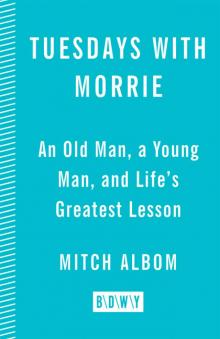 Tuesdays With Morrie
Tuesdays With Morrie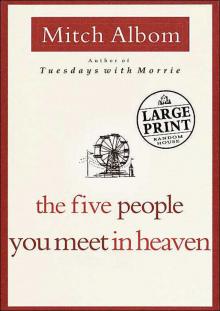 The Five People You Meet in Heaven
The Five People You Meet in Heaven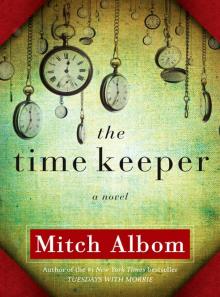 The Time Keeper
The Time Keeper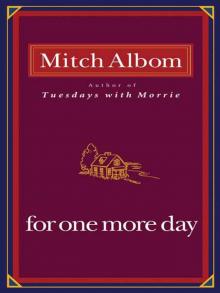 For One More Day
For One More Day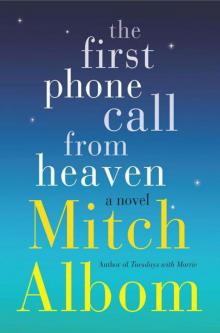 The First Phone Call From Heaven: A Novel
The First Phone Call From Heaven: A Novel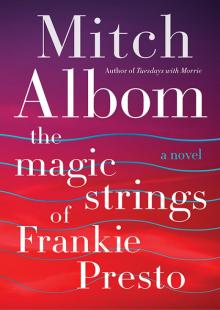 The Magic Strings of Frankie Presto
The Magic Strings of Frankie Presto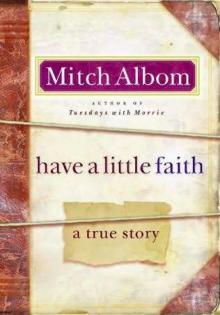 Have a Little Faith: A True Story
Have a Little Faith: A True Story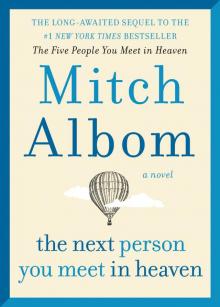 The Next Person You Meet in Heaven
The Next Person You Meet in Heaven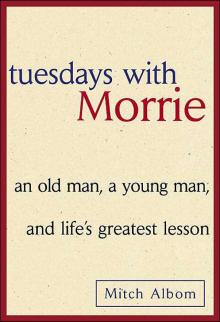 Tuesdays with Morrie: an old man, a young man, and life’s greatest lesson
Tuesdays with Morrie: an old man, a young man, and life’s greatest lesson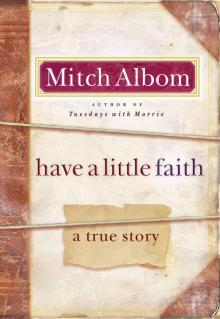 Have a Little Faith
Have a Little Faith